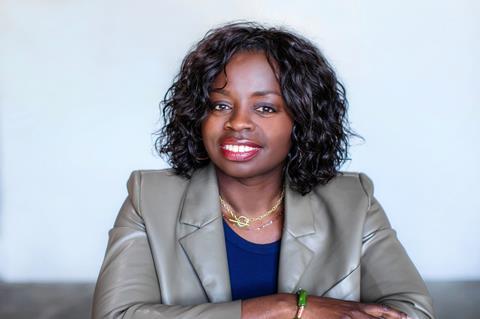Jo Saxton is founder of the Ezer Collective, an initiative dedicated to investing in women leaders around the world. She speaks with our editor, Tola-Doll Fisher about why she is so passionate about ensuring everyone – female or male - can reach their potential
Tola-Doll Fisher (TDF): You’ve been working in the area of women and leadership for a while now. Tell me about Ezer Collective.
Jo Saxton (JS): Ezer Collective is an initiative designed to invest in Christian women leaders across industries. I host a two-day event here in Minneapolis, where we gather together women from pastors to entrepreneurs to creatives with the goal being leadership development through skills, networking, prayer, worshipping.
TDF: Where does the name Ezer come from?
JS: Ezer is an ancient Hebrew word found in the Bible, describing women in Genesis 2:18, where it says: “I will make a helper suitable for him.” When we think of the word ‘help’, we think assistant, we think wingman, wingwoman. But the word is actually a combination of a few words meaning ‘to rescue’, ‘to save’ and ‘to be strong’, which is a very different word. There are over 100 instances of the root of this word in the Old Testament. There are 21 occasions where you find the exact word. Two times it’s defining the woman. Three times it’s referring to powerful military aid and intervention. There are men called Ezer in the Bible, and I think that’s an important thing, because in the Bible, a name isn’t just an assignment. It refers to your identity and personality. And about 16 times we see it used where God is delivering his people from their enemies. For example, “God is our refuge and strength, an ever-present help in trouble” (Psalm 46:1) and the same word is used in: “I lift my eyes up to the mountains. Where does my help come from?” (Psalm 121:1). If we believe the Bible is authoritative, then that should tell us something about what God had in mind when he was making women – before anything was wrong with the world.
TDF: It might sound like an obvious question to ask, but why do you care so much about women – and especially Christian women – in leadership?
JS: Partly because of my own experiences as a woman leader, where I was often the only woman in the room, often the only black woman in the room. And knowing that it’s not because there aren’t gifted women around. I know that women are image bearers. I know that women are Ezers. We see women throughout scripture, leading in various ways; whether Lydia as a businesswoman, Sheerah in 1 Chronicles 7:24, who built three towns, or Deborah, who was a judge. So, for me, rather than thinking: “Oh, don’t we want to make sure a woman’s qualified?” my assumption, because women are image bearers, is that there are lots of qualified women we haven’t reached, and we haven’t connected with. What I often found in the environments I was in is that they failed to recognise some of the challenges women faced, whether it was economically, in terms of paying women equally, or training. I would meet a lot of women on the road [speaking engagements], where they would be asking me lots and lots of questions [about women’s leadership development].
Women’s leadership development is worth more than five minutes squeezed in between other moments. This isn’t just about what women are missing out on; what is the Church missing out on? What is society missing out on? What are men missing out on? What are we all missing out on when we are not equipping everybody fully for them to realise their God-given potential. I’ve always been passionate about leadership, and it just felt like there’s a gap. What does it look like for us to fill the gap?
TDF: So, what are the characteristics of a good leader and do we look for different things in women compared with men?
JS: I go back and forth on this. And I think I go back and forth on this because of being Nigerian, being born at a Brit and then living in America. So that’s three different cultures. And what are the social expectations that are seen as male and female? Because I remember someone saying to me once: “Aren’t women meant to be gentler, and aren’t women meant to be quieter?” I just thought: “We’ve turned a leadership skill into a personality type. Like, aren’t women meant to be at home?” Well, tell that to a woman in agriculture! The number of times I’ve been in environments where people have said: “Why are you shouting?” and I’m like: “No, I’m not shouting. This is how I talk. Now, if you consider that loud, or if you consider that aggressive, then you’ve decided that only men are meant to be that way.”
TDF: Do you think the Church needs more female leadership?
JS: Yeah, although I probably would ask the question differently. I would probably ask the question of our churches: are they equipping men and women to be all that God designed them to be? If we’re not doing it, then we probably aren’t seeing it for both men and women.
This isn’t just about what women are missing out on; what is the Church missing out on?
I would say, if they were resourcing their people, well, they would have women leaders. And I would ask at denominational level and individual church level, what are the pipelines we have for leadership development? Are they accessible to men and women? Are they accessible to people who are differently abled? Are they accessible to people of different cultures? And, if not, why not? Are there ways we can do that that still provide robust leadership development, but it’s contextual enough for it to make sure we are raising image bearers to the fullness of their capacity?
I think it would be a problem if you had an all-female leadership team, because how do you fully represent the guys there? When we say we have such an expansive mission to seek and save the loss, to reach the world, to reach our communities and our teams don’t look like the communities we’re in, then how are we going to get to that point?

TDF: Do you think women can’t lead men?
JS: Oh, I think women can lead men. I’m just saying, in the same way that an all-male team doesn’t fully represent the group, an all-female team doesn’t either. And I’m interested in seeing [both] men and women fully lead.
TDF: OK, so what are your thoughts on Trump opposing diversity, equity and inclusion (DEI) on the grounds of it being unfair or discriminatory?
JS: I have many feelings about these things, as you can imagine. That phrase has become a buzzword, and has been used reductively, and also remember we’re talking about someone who tells a lot of lies.
Interestingly, studies have shown the greatest beneficiaries of affirmative action and DEI have been white women. that’s not to say that it hasn’t benefitted people of colour and black people. I’m just saying that that sometimes when people think DEI, they look at you and me like, we have been given a handout or a leg up. And that’s not necessarily the case.
[I question whether] there is a genuine reflection about DEI, [or if it isn’t] a tactic to shock and create some drama while also doing other policies, because we’re so busy reacting to this that we’re not paying attention to some other stuff.
TDF: You’ve lived in the US for a number of years. Do you get much chance to witness the opportunities women have for leadership/for raising women leaders in the UK?
JS: Yeah, I have, and it’s always a real privilege going back to the UK. I’m surprised I still get asked to speak at things, but I was at Renaissance [conference] last year and at The Orchard [women’s conference] the year before. I love that I don’t know everybody who’s there, because that means you know that things are happening.
In the same way that an all-male team doesn’t fully represent the group, an all-female team doesn’t either
I love that there are lots of initiatives across denominations; small things, big things, where people are investing in women in leadership, investing in Christian women leaders, investing in ministry leaders, and that excites me, but it does remind me that there’s a lot of work to be done, and I think things like misogyny have a fresh face every generation. We have to keep on being intentional in this work to ensure that we are being faithful to our call. Because this is an expression of the Great Commission. This stuff, of course, is going to be attacked. Of course it’s going to be undermined.
TDF: What do you want to share with Woman Alive readers to encourage them?
JS: I want to remind readers that they are image bearers. I want them to check out the understanding of Ezer and what that looks like. Because I’ve seen that word weaponised, [used to act] like a bludgeon to people’s dreams.
I want to encourage you that if you feel like God is stirring something within you, put yourself in context where you can explore what that means. There’s something really wonderful about discovering you’re an image bearer, that you’re made in the image of God, that you’re fearfully and wonderfully made, but that means the gifts and the talents and the abilities you have are part of a part of that, and you represent him in the world. We spend a lot of time hiding our gifts and calling it humility [or] politeness. Step up and step out into what God’s calling you to do. And if you’re like: “You know what, I feel my primary space is in my family”, then this isn’t a criticism of that. You do what God’s calling you to do in each chapter of your life. Let’s celebrate each other doing that. Let’s make spaces for that and create things that support and celebrate rather than tolerate the range of women God has made.
Jo Saxton is a speaker, podcaster and author. She is the founder of the Ezer Collective, an initiative dedicated to investing in women leaders around the world, equipping them to own their voice, and boldly step into their calling. She currently serves as the executive director of The 25 (a leadership development initiative) at Bethel University.
Born to Nigerian parents and raised in London, England, Jo now lives in Minneapolis with her husband and two daughters.
Ezer Collective: josaxton.com/ezer-collective
Lead Stories Podcast: leadstoriespodcast.com
Follow Jo - Facebook: @1josaxton, Insta: @josaxton

































No comments yet